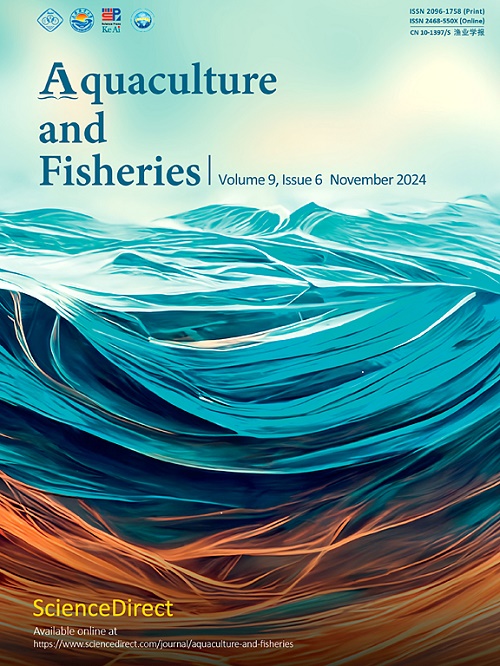壳聚糖基可生物降解涂层,用于确保挤压鱼饲料颗粒中的营养物质
Q1 Agricultural and Biological Sciences
引用次数: 0
摘要
本研究的目的是评价可生物降解壳聚糖涂层对沉鱼饲料质量参数的影响。饲料颗粒直径为5mm,包被1%和2%壳聚糖。对包覆和未包覆(对照)球团的尺寸(长度、直径)、重量、下沉速度、可浮性、硬度和吸水指数进行评价。利用菲克第二定律对人工海水中维生素C的损失进行了动力学模拟。壳聚糖包覆降低了微丸在海水中维生素C的损失,未包覆、壳聚糖包覆1%和2%的微丸的维生素C损失扩散系数分别为1.10×10−10、4.50×10−11和1.20×10-11 m2/s。壳聚糖包覆后,样品的水溶性指数显著降低,1%壳聚糖包覆后为26.87%,1%壳聚糖包覆后为11.53%,2%壳聚糖包覆后为9.91%。然而,壳聚糖涂层增加了颗粒的水活性,导致与对照颗粒相比颜色更深(亮度更低)。研究表明,壳聚糖作为生物可降解涂层,在不影响球团主要物理力学性能的情况下,可显著减少球团在下沉过程中水分的流失。本文章由计算机程序翻译,如有差异,请以英文原文为准。

Chitosan-based biodegradable coatings for securing nutrients in extruded fish feed pellets
The aim of this study was to evaluate the effect of a biodegradable chitosan-based coating on the quality parameters of sinking fish feed. The feed pellets had a diameter of 5 mm and were coated with 1 % and 2 % chitosan. Coated and uncoated (control) pellets were evaluated for their dimensions (length, diameter), weight, sinking velocity, floatability, hardness and water absorption index. Vitamin C loss during sinking in artificial sea water was kinetically modelled using Fick's 2nd law. The coatings reduced the loss of vitamin C when the pellets were immersed in seawater, the diffusion coefficients for vitamin C loss were calculated to 1.10×10−10, 4.50×10−11, and 1.20×10–11 m2/s for uncoated pellets, pellets coated with 1 % and 2 % chitosan, respectively. In addition, the chitosan coating led to a significant decrease in the water solubility index, to 26.87 %, 11.53 % and 9.91 % for control samples and pellets coated with 1 % and 2 % chitosan, respectively. However, chitosan coating increased the water activity of the pellets and resulted in a darker colour compared to the control pellets (lower lightness). The research demonstrated that the application of chitosan as a biodegradable coating may significantly reduce nutrient loss in water during sinking without affecting the main physical and mechanical properties of the pellets.
求助全文
通过发布文献求助,成功后即可免费获取论文全文。
去求助
来源期刊

Aquaculture and Fisheries
Agricultural and Biological Sciences-Aquatic Science
CiteScore
7.50
自引率
0.00%
发文量
54
审稿时长
48 days
期刊介绍:
 求助内容:
求助内容: 应助结果提醒方式:
应助结果提醒方式:


